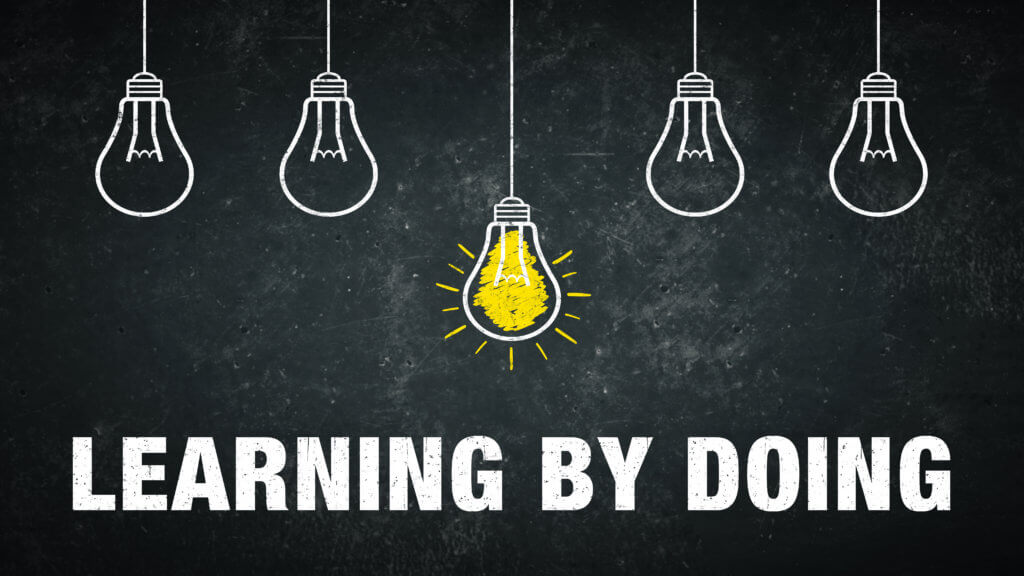Using Design Thinking to Empower Learners
Pricing
FREE for Members
– Or –
$4/ On-demand Workshop for Non-Members
*The links to purchase individual workshops are available under the workshop descriptions.
Categories: Differentiation & Personalization; Learning Theories & Strategies || 6 hours (for total workshop) || 60 min / workshop
About the Workshop Series:
Design thinking is a human centered, problem-solving process rooted in empathy. Join Lauren Boucher and Brian Whitson for a series of six collaborative, hands-on workshops where you will have the opportunity to explore the Design Thinking Process and create transformative learning experiences that will cultivate student creativity, critical thinking, collaboration, communication, and student agency.
By the end of this workshop series, you will be able to:
Define Design Thinking and explain the role that empathy plays in the Design Thinking Process.
List the steps of the Design Thinking Process and recognize the benefits of using it to empower learners.
Explain the value of starting with Design Sprints when introducing the Design Thinking Process to students.
Design, adapt, and implement a Design Sprint framework to actively engage students and practice the steps of the Design Thinking Process.
Explain the value of providing opportunities for students to practice and expand their empathetic and creative thinking in the classroom.
Design and implement activities that foster creative thinking and allow students time to build and expand upon their empathy skills.
Define steps one and two of the Design Thinking Process and explain how students can use them to solve problems and practice essential skills such as collaboration, communication, creativity, and critical thinking.
Expand the ability to teach empathy so that students have a deeper appreciation of people's emotional and physical needs and the way they see, understand, and interact with the world around them.
Define steps three through five of the Design Thinking Process and explain how students can use them to solve problems and practice essential skills such as collaboration, communication, creativity, and critical thinking.
Develop a plan for incorporating the Design Thinking Process into a content-specific student project that fosters a solution-based approach to solving a problem.
Define steps one through five of the Design Thinking Process and explain how students can use them to solve problems and cultivate essential skills such as creativity, critical thinking, collaboration, communication, and student agency.
Develop a plan for evaluating students’ projects that captures both the final product and the learning that occurred throughout the Design Thinking Process.
Series Workshop Descriptions
This is session one of six for the workshop series titled “Using Design Thinking to Empower Learners”
NOTE: While we recommend that you attend all sessions of the workshop series to meet the learning objectives, each workshop can be attended as a standalone. Full members will also have access to view the recordings on-demand and earn up to six Certificates of Completion.
Now Available On-Demand:
Workshop Description:
Are you looking for an innovative way to foster creativity, inspire innovation, and engage every student in your classroom? Implementing Design Thinking can help unleash the creative potential of your students, while allowing them to pursue their individual interests and passions! Join Lauren Boucher and Brian Whitson to learn more about the Design Thinking process and how it can be used with any grade level or subject area. Participants will also have an opportunity to access done-for-you templates and support materials to create their own content-specific learning experiences that they can immediately use with their students.
Learning Objectives:
- Define Design Thinking and explain the role that empathy plays in the Design Thinking Process.
- List the steps of the Design Thinking Process and recognize the benefits of using it to empower learners.
Special Technology Instructions:
Participants will need access to an internet device and a non-school, personal Google account. SimpleK12’s Google Classroom will be utilized for the interactive and hands-on components of this workshop.
Participants will also need access to two devices: one to view the training and one to participate in the make-and-take component. In addition, access to a digital creation tool will be required, such as Google Slides, Google Drawings, Adobe Creative Cloud, Canva, etc.
Assessment:
Participants will use the templates and support materials provided to create a content-specific learning experience to demonstrate their understanding of the workshop objectives and reflect on their learning.
This is session two of six for the workshop series titled “Using Design Thinking to Empower Learners”
NOTE: While we recommend that you attend all sessions of the workshop series to meet the learning objectives, each workshop can be attended as a standalone. Full members will also have access to view the recordings on-demand and earn up to six Certificates of Completion.
Now Available On-Demand:
Workshop Description:
Just like sprints in track and field, Design Sprints are short projects that are structured to help students learn the steps in the Design Thinking Process. Join Lauren Boucher and Brian Whitson as they share the value of starting with Design Sprints when introducing Design Thinking, including best practices for implementing the framework with your students. Participants will also have an opportunity to access done-for-you templates and support materials to create their own content-specific learning experiences that they can immediately use with their students.
Learning Objectives:
- Explain the value of starting with Design Sprints when introducing the Design Thinking Process to students.
- Design, adapt, and implement a Design Sprint framework to actively engage students and practice the steps of the Design Thinking Process.
Special Technology Instructions:
Participants will need access to an internet device and a non-school, personal Google account. SimpleK12’s Google Classroom will be utilized for the interactive and hands-on components of this workshop.
Participants will also need access to two devices: one to view the training and one to participate in the make-and-take component. In addition, access to a digital creation tool will be required, such as Google Slides, Google Drawings, Adobe Creative Cloud, Canva, etc.
Assessment:
Participants will use the templates and support materials provided to create a content-specific learning experience to demonstrate their understanding of the workshop objectives and reflect on their learning.
This is session three of six for the workshop series titled “Fostering Empathy & Creativity through the Design Thinking Process”
NOTE: While we recommend that you attend all sessions of the workshop series to meet the learning objectives, each workshop can be attended as a standalone. Full members will also have access to view the recordings on-demand and earn up to six Certificates of Completion.
Now Available On-Demand:
Workshop Description:
Too often our students lack opportunities to practice and expand upon their empathetic and creative thinking skills in the classroom. Join Lauren Boucher and Brian Whitson as they share the importance of fostering creativity and empathy through the Design Thinking Process and providing students with ample time to develop their newfound skills. Participants will also have an opportunity to access done-for-you templates and support materials to create their own content-specific learning experiences that they can immediately use with their students.
Learning Objectives:
- Explain the value of providing opportunities for students to practice and expand their empathetic and creative thinking in the classroom.
- Design and implement activities that foster creative thinking and allow students time to build and expand upon their empathy skills.
Special Technology Instructions:
Participants will need access to an internet device and a non-school, personal Google account. SimpleK12’s Google Classroom will be utilized for the interactive and hands-on components of this workshop.
Participants will also need access to two devices: one to view the training and one to participate in the make-and-take component. In addition, access to a digital creation tool will be required, such as Google Slides, Google Drawings, Adobe Creative Cloud, Canva, etc.
Assessment:
Participants will use the templates and support materials provided to create a content-specific learning experience to demonstrate their understanding of the workshop objectives and reflect on their learning.
This is session three of six for the workshop series titled “Exploring Design Thinking Through Student Projects (Part 1).”
NOTE: While we recommend that you attend all sessions of the workshop series to meet the learning objectives, each workshop can be attended as a standalone. Full members will also have access to view the recordings on-demand and earn up to six Certificates of Completion.
Now Available On-Demand:
Workshop Description:
Design Thinking is a problem-solving process that involves five key steps: empathize, define, ideate, prototype, and test. Join Lauren Boucher and Brian Whitson as they dive deep into steps one and two of the Design Thinking Process and explain how to develop a plan for utilizing effective problem-solving projects with students. Participants will also have an opportunity to access done-for-you templates and support materials to create their own content-specific learning experiences that they can immediately use with their students.
Learning Objectives:
- Define steps one and two of the Design Thinking Process and explain how students can use them to solve problems and practice essential skills such as collaboration, communication, creativity, and critical thinking.
- Expand the ability to teach empathy so that students have a deeper appreciation of people's emotional and physical needs and the way they see, understand, and interact with the world around them.
Special Technology Instructions:
Participants will need access to an internet device and a non-school, personal Google account. SimpleK12’s Google Classroom will be utilized for the interactive and hands-on components of this workshop.
Participants will also need access to two devices: one to view the training and one to participate in the make-and-take component. In addition, access to a digital creation tool will be required, such as Google Slides, Google Drawings, Adobe Creative Cloud, Canva, etc.
Assessment:
Participants will use the templates and support materials provided to create a content-specific learning experience to demonstrate their understanding of the workshop objectives and reflect on their learning.
This is session three of six for the workshop series titled “Exploring Design Thinking Through Student Projects (Part 2).”
NOTE: While we recommend that you attend all sessions of the workshop series to meet the learning objectives, each workshop can be attended as a standalone. Full members will also have access to view the recordings on-demand and earn up to six Certificates of Completion.
Now Available On-Demand:
Workshop Description:
Design Thinking is a problem-solving process that involves five key steps: empathize, define, ideate, prototype, and test. Join Lauren Boucher and Brian Whitson as they dive deep into steps three through five of the Design Thinking Process and explain how to develop a plan for utilizing effective problem-solving projects with students. Participants will also have an opportunity to access done-for-you templates and support materials to create their own content-specific learning experiences that they can immediately use with their students.
Learning Objectives:
- Define steps three through five of the Design Thinking Process and explain how students can use them to solve problems and practice essential skills such as collaboration, communication, creativity, and critical thinking.
- Develop a plan for incorporating the Design Thinking Process into a content-specific student project that fosters a solution-based approach to solving a problem.
Special Technology Instructions:
Participants will need access to an internet device and a non-school, personal Google account. SimpleK12’s Google Classroom will be utilized for the interactive and hands-on components of this workshop.
Participants will also need access to two devices: one to view the training and one to participate in the make-and-take component. In addition, access to a digital creation tool will be required, such as Google Slides, Google Drawings, Adobe Creative Cloud, Canva, etc.
Assessment:
Participants will use the templates and support materials provided to create a content-specific learning experience to demonstrate their understanding of the workshop objectives and reflect on their learning.
This is session three of six for the workshop series titled “Implementing and Evaluating Design Thinking Student Projects.”
NOTE: While we recommend that you attend all sessions of the workshop series to meet the learning objectives, each workshop can be attended as a standalone. Full members will also have access to view the recordings on demand and earn up to six Certificates of Completion.
Now Available On-Demand:
Workshop Description:
Projects that cultivate student creativity, critical thinking, collaboration, communication, and student agency often require feedback and evaluation that goes beyond a letter or number grade. Join Lauren Boucher and Brian Whitson as they discuss a variety of evaluation practices for Design Thinking projects, including student-created rubrics. Participants will also have an opportunity to access done-for-you templates and support materials to create their own content-specific learning experiences that they can immediately use with their students.
Learning Objectives:
- Define steps one through five of the Design Thinking Process and explain how students can use them to solve problems and cultivate essential skills such as creativity, critical thinking, collaboration, communication, and student agency.
- Develop a plan for evaluating students’ projects that captures both the final product and the learning that occurred throughout the Design Thinking Process.
Special Technology Instructions:
Participants will need access to an internet device and a non-school, personal Google account. SimpleK12’s Google Classroom will be utilized for the interactive and hands-on components of this workshop.
Participants will also need access to two devices: one to view the training and one to participate in the make-and-take component. In addition, access to a digital creation tool will be required, such as Google Slides, Google Drawings, Adobe Creative Cloud, Canva, etc.
Assessment:
Participants will use the templates and support materials provided to create a content-specific learning experience to demonstrate their understanding of the workshop objectives and reflect on their learning.
Who Should Attend?
Elementary Educators (K-5), Middle Grades Educators (6-8), High School Educators (9-12), Special Education Teachers, Other school support staff, Curriculum Directors / Instructional Support, Administrators
Meet the Presenters

Lauren Boucher is a Regional Digital Teaching and Learning Consultant for the state of North Carolina and a former Instructional Technology Specialist with Pitt County Schools. She has taught third grade, as well as elementary and middle school gifted education. Lauren is passionate about the transforming effect technology can have on the teaching and learning experience, and about inspiring classroom teachers to incorporate technology into their everyday routines. Most of her time is spent working with teachers to incorporate 1:1 technologies, sharing Web 2.0 tools with teachers, developing classroom and device management plans, and writing the Latin curriculum for her district's gifted program.
As a North Carolina Teaching Fellow, Lauren earned a B.S. and Master's degree in Elementary Education. She is licensed to teach K-12 academically gifted, and will add the Computers in Education special endorsement to her teaching license in 2014. She is a SMART certified lesson developer and a SMART Exemplary Educator. Lauren presents at numerous local and state conferences on using technology in the classroom.
What are workshops? How do they work?
Collaborative opportunities to learn new skills and strategies that can be applied right away.
Hows does SK12 support PD options for educators? We empower educators with training created by teachers for teachers. Virtual, on-demand, 30-minute sessions, and 60-minute workshops.
What solutions are there for districts offering PD to educators? Districts can scale PD offerings with relevancy for each building and individual educator.
Need to become a member?
Things to Know
Live Attendance
In order to receive credit for attendance and CEUs for each individual workshop, you must be a member and be in attendance and participating throughout the whole 60-minutes. Members who are in attendance and complete all required aspects of the workshop will see their completion status reflected on their Certificate of Attendance and CEUs applied to their profile on their Teacher Learning Community profile, typically within 48 hours of completion.
On-Demand
- Members can access any workshops they may have missed on-demand. Recordings of the workshops are typically available within 3 days following the live workshop.
- Non-members will need to pay for each individual workshop they would like to watch. *CEUs and Certificate of Completion are not provided for non-members.
CREDITS
- 1 CEU learning hour is provided for each workshop you attend.
Anyone! If you find a workshop that appeals to you, you are welcome to join us.
Live workshops are 60-minutes in duration. Attendees will have access to the ‘workroom' following the workshop so they can continue collaborating with peers. Additionally, the trainer is available for 24 hours following the workshop to help coach.
While it's recommended you attend every workshop of a series to make sure you are achieving all learning outcomes, each workshop can be viewed as a stand-alone.
- Workshops will be available on-demand in the Teacher Learning Community for UpTeach members, typically within 3-5 days after the workshop has ended. NOTE: Non-members will need to pay to access the on-demand workshop.
- UpTeach members will also have access to the associated classroom to view the participant discussion stream and access any resources supplied. NOTE: Access to the trainer is only available during the actual workshop.
We host at least one virtual workshop per week throughout the year, with the exception of holiday weeks. Times for workshops vary due to many of our trainers being educators and school consultants themselves. This means that typically workshops are held after school hours ET.
We are excited to say that workshops are now included with Premium (UpTeach®) member subscriptions and district memberships.
Don't have a membership yet? No problem. Get signed up today!
*The links to purchase individual workshops are available under the workshop descriptions.
- Internet access.
- Access to GoToWebinar. Whether you use the download app or an internet browser, trainers present direct instruction and communicate throughout the training via GoToWebinar.
- Access to Google Classrooms. Please make sure you are in a setting where you will have access to Google Classrooms. NOTE: Some school firewalls will not allow you to access Google Classrooms from your classroom. In these cases, you may need to be in your home to participate. Additionally, if your school email address is already associated with Google Classrooms, you will need to use a different personal email address to join so that you are not locked out of the training. Again, due to school privacy restrictions on some school email addresses.
Yes! If you have access to dual monitors, this is ideal. With this type of setup, you will be able to keep GoToWebinar open on one screen, and Google Classrooms open on another.
If you do not have access to a dual monitor setup, no worries! You will just need to make sure you can ‘toggle/switch' between the two.





